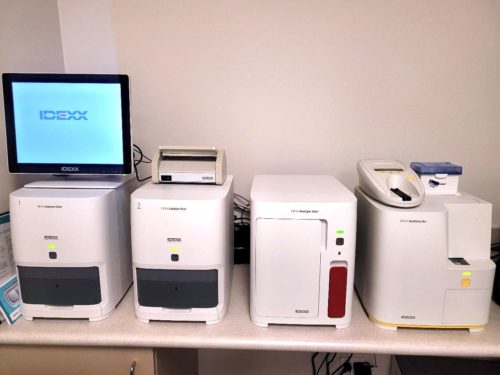
Aurora Hills Animal Hospital is pleased to offer a wide range of laboratory testing utilizing our all-new state-of-the-art in-house equipment as well as an outside reference laboratory.
Feline viral test: FelV (feline leukemia) and FIV (feline HIV) are spread through cat contact and are commonly diagnosed in outdoor cats.
Heartworm test: A blood test to evaluate for the presence of heartworm disease.
Fecal parasite screen: Microscopic evaluation of the stool to look for protozoans or eggs of worms.
Stained cytology: Cells are removed from a tumor, skin lesion, or body fluid. Special staining techniques highlight the various cells microscopically. We can read a cytology almost instantly to evaluate for infection, inflammation, and cancerous cells.
Urinalysis: Urine is collected and evaluated for protein, sugar, blood, bacteria, crystals, and abnormal cells.
Packed Cell Volume (PCV) and Total Protein: Whole blood is collected and evaluated for the number of red blood cells and the amount of protein.
Complete Blood Count (CBC): Whole blood is collected and analyzed to count the numbers of the different cell types. We evaluate for anemia, leukemia, thrombocytopenia, and inflammation.
Serum chemistry: Whole blood is collected and then the serum (fluid component) is separated from the blood cells. The serum is analyzed to evaluate proteins, liver values, kidney values, blood sugar, pancreatic values, cholesterol, and electrolytes.
Thyroid hormone levels: The serum component of the blood is analyzed to determine the level of thyroid hormone. A common disease in cats is hyperthyroidism which is the over-production of thyroid hormone. A common disease in dogs is hypothyroidism which is the under-production of thyroid hormone.
A vast array of specialized testing is also available when our screening lab work reveals abnormalities.

